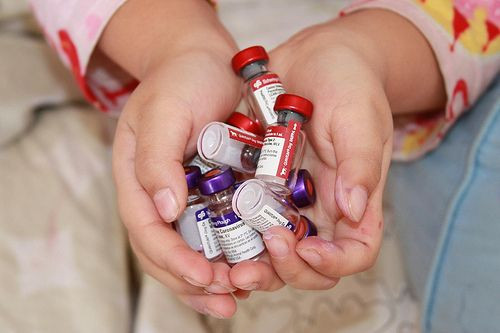Amid Fears Of Autism, No Link Found Between Vaccines And Neurological Disorders In Children

One in 88 children is diagnosed autistic before his eighth birthday. That rate shrinks to one in 54 for boys, who are nearly five times more likely to have the condition than girls. Swirling around this growing body of diagnoses is a debate over the disorder’s cause, which scientists have not yet established, but it continues to draw speculation, particularly from people who argue rising vaccination rates are playing a key role.
However, a recent study adds to the evidence that suggests otherwise. Published in Pharmacoepidemiology and Drug Safety, the study culled publicly available data on the immunization rates of seven to 10 year olds from four managed care organizations from when they were seven months, 12 months, and 24 months old. Researchers tested the children for a variety of cognitive and physiological functions and compared the findings with the number of antigens they received during infancy. No connection was found between immunization rates and neurological disorders.
“Some parents are concerned that too many vaccines administered too early in life may adversely affect a child’s health, including neuropsychological development,” said the study’s lead author, Dr. Shahed Iqbal, from the Centers for Disease Control and Prevention (CDC), in a press release. “Concerns about the number of vaccines and their effects on children's health and development can lead to vaccine refusals or delays in childhood immunizations.”
Refusals For Vaccines Among Ambiguity Of Threat
Such has been the case in areas of the United States where religious, philosophical, and medical exemption allows parents to delay or refuse vaccination until later age. The CDC reported in 2011 that exemption rates nationwide ranged from less than one percent to 6.2 percent for all vaccines. One 2003 survey from the Institute of Medicine (IoM) found one-third of parents had concerns over the safety of vaccines — namely, the measles-mumps-rubella (MMR) vaccine that has drawn great controversy in recent decades.
Ten percent of parents in the IoM study reported having delayed or refused required immunization for their child.
Iqbal and his team found, on average, children received 7,266, 8,127, and 10,341 antigens by ages seven, 12, and 24 months respectively. The number of antigens wasn’t found to have any impact on neurological outcomes, which the researchers measured through general intellectual function, speech and language, verbal memory, attention and executive function, tics, achievement, visual spatial ability, and behavior regulation.
“We assessed immune exposure from vaccines using a measure of total number of antigens in vaccines received during the first two years of life,” stated Iqbal, “and found no association with the development of neuropsychological outcomes later in childhood.”
The threat of neurological disorders resulting from vaccination has been quieted scientifically in a number of studies over the last decade.
One 2005 Japanese study, published in the Journal of Child Psychology and Psychiatry, collected data on 300,000 Yokohama children born between 1988 and 1996. In 1993, the city stopped vaccinating children for MMR, and surprisingly enough, what they found between 1993-1996 vs. 1988-1993 was an increase in autism rates. Children who hadn’t received an MMR vaccine actually got diagnosed with autism more.
But the original research into discrediting vaccinations’ influence on autism began in 1999, with an intensely controversial study — which was retracted from The Lancet in 2004 — that found a positive correlation between children vaccinated for MMR and autism and bowel symptoms. Dr. Andrew Wakefield, who led the study, had his medical license revoked in 2010 after financial conflicts of interest were found to have compromised his medical integrity in conducting the study.
Since Wakefield’s study, a couple of other studies have popped up that uphold a link between autism and vaccinations. A 2002 Utah State University study found children with autism had abnormally high rates of adverse reaction to the MMR vaccine. Ninety percent of subjects with adverse reaction were found to be reportedly linked to the condition. However, the study has been criticized by vaccine supporters, the CDC, and the American Academy of Pediatrics, as being inconclusive regarding a causal link.
The Future Debate
The increasing rates of autism in the U.S. have no agreeable, singular cause, which muddies a discussion on the subject when it comes to vaccinations, the rates of which have also risen in recent years. In 2000, one in 150 children was diagnosed autistic. That rate shrank to one in 125 by 2004, one in 110 by 2006, and has arrived at the current figure of one in 88 (according to 2008 data, the most recent year available).
What’s more, the CDC reports one in six children in the U.S. had a developmental disability in 2006-2008. These ranged from subtler impairments in speech and language to graver, more overt complications such as intellectual disabilities, cerebral palsy, and autism.
As the rates for both vaccinations and neurological disorders increase side by side, a debate over their link can only be fueled with relevant, rigorous data, as many experts believe it is one of the landmark controversies of the modern age.
Source: Iqbal S, Barile JP, Thompson WW, DeStefano F. Number of antigens in early childhood vaccines and neuropsychological outcomes at age 7–10 years. Pharmacoepidemiology and Drug Safety. 2013.
Published by Medicaldaily.com



























